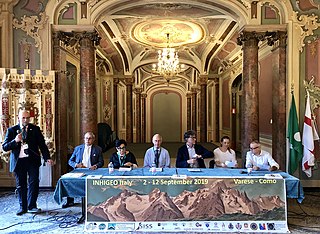The Association for Computing Machinery (ACM) is a US-based international learned society for computing. It was founded in 1947 and is the world's largest scientific and educational computing society. The ACM is a non-profit professional membership group, reporting nearly 110,000 student and professional members as of 2022. Its headquarters are in New York City.
AIESEC is an international "youth-run" and led, non-governmental and not-for-profit organization that provides young people with business development internships. The organization focuses on empowering young people to make a progressive social impact. The AIESEC network includes approximately 40,000 members in 120+ countries.

The American Mathematical Society (AMS) is an association of professional mathematicians dedicated to the interests of mathematical research and scholarship, and serves the national and international community through its publications, meetings, advocacy and other programs.

The Association for Computational Linguistics (ACL) is a scientific and professional organization for people working on natural language processing. Its namesake conference is one of the primary high impact conferences for natural language processing research, along with EMNLP. The conference is held each summer in locations where significant computational linguistics research is carried out.
The Organization of World Heritage Cities (OWHC) is an international non-profit, non-governmental organization of 250 cities in which sites of the UNESCO World Heritage list are located. It was founded in 1993 in Fez, Morocco, during the second International Symposium of World Heritage Cities. The headquarters of the OWHC are located in Quebec City, Quebec, Canada. Altogether the 250 member cities of the OWHC have a population of more than 130 million.
Molinology is the study of mills and other similar devices which use energy for mechanical purposes such as grinding, fulling or sawing.
The International Union of Food Science and Technology (IUFoST) is the global scientific organization and voice for food science and technology representing more than 300,000 food scientists, engineers and technologists through its work in more than 100 countries. It is a voluntary, non-profit association of national food science organizations. IUFoST is the only elected scientific representative of Food Science and Technology in the International Science Council (ISC), elected by its peers across scientific disciplines. It is the only global representative of food science and technology to notable organizations such as the World Health Organization (WHO), Food and Agriculture Organization (FAO) of the United Nations, United Nations Development Programme and (UNDP), CODEX Alimentarius.

The International Federation of Medical Students' Associations (IFMSA) is a non-governmental organization representing associations of medical students. It was founded in May 1951 and currently maintains 133 member organizations from 123 countries around.

Founded in 1990 in Rome, the European Society for the Study of English (ESSE) is the largest and most comprehensive organization for university teachers and researchers in English Studies, including literature, linguistics, and cultural studies, throughout Europe. It is an association (Verein) conformable to articles 60ff of the Swiss Civil Code (ZGB) with its seat in Basle. As stated in the 2022 ESSE Treasurer's Report for the ESSE Board Meeting in Mainz, 28 August 2022 (p. 4), currently, ESSE has 33 national associations and, according to the November 2021 membership lists, there are 7,590 members of ESSE.

Draper's Windmill or Old Mill is a Grade II listed Smock mill in Margate, Kent, England that was built in 1845.
The European Association of Science Editors is a non-profit membership organisation for people interested in science communication and editing. Founded in 1982, in France, EASE has an international membership.
The Society for Philosophy and Technology (SPT) is an independent international organization founded in 1976 whose purpose is to promote philosophical consideration of technology. SPT publishes Techné: Research in Philosophy and Technology, a tri-annual scientific journal.

The International Commission on the History of Geological Sciences (INHIGEO) promotes ongoing research into the history of the earth sciences, particularly the history of geology. It has 20 Honorary Senior Members and 301 members (2018) worldwide.

European University Sports Association (EUSA) is an umbrella non-governmental (NGO) non-profit organisation, working in the field of university sport in Europe.

Timothy Noel Palmer is a mathematical physicist by training. He has spent most of his career working on the dynamics and predictability of weather and climate. Among various research achievements, he pioneered the development of probabilistic ensemble forecasting techniques for weather and climate prediction. These techniques are now standard in operational weather and climate prediction around the world, and are central for reliable decision making for many commercial and humanitarian applications.
The European Society of Aesthetic Surgery (ESAS) is a teaching organization which aims at enhancing the knowledge of cosmetic surgical techniques and concepts. The main aim of the society is to furnish its members with teaching surgical skills. On a yearly basis the society sponsors meetings and workshops. The conference proceedings are published in journals.
The European Young Chemists' Network (EYCN) is the young division of the European Chemical Society (EuChemS), and aims at promoting chemistry among young people, under the age of 35, that belong to a fellow European society.
The International Union of Game Biologists (IUGB) is a non-profit organisation with international membership. It has its legal domicile in Cernier, Switzerland. Bylaws were signed in Moscow in 2009.
The International Biodeterioration and Biodegradation Society (IBBS) is a scientific society with an international membership. It is a charity registered in the UK. IBBS belongs to the Federation of European Microbiological Societies (FEMS), along with national organizations from European countries and appears in the Yearbook of International Organisations On-line, published by the Union of International Associations. The aim of IBBS is to promote and spread knowledge of Biodeterioration and Biodegradation. Conferences are arranged on specific topics and every three years an International Symposium covering a wide range of research in these scientific areas is organized; the last (IBBS17) was held in Manchester, UK. Members can apply for various grants or bursaries. The Society's journal, International Biodeterioration and Biodegradation, is published by Elsevier.







